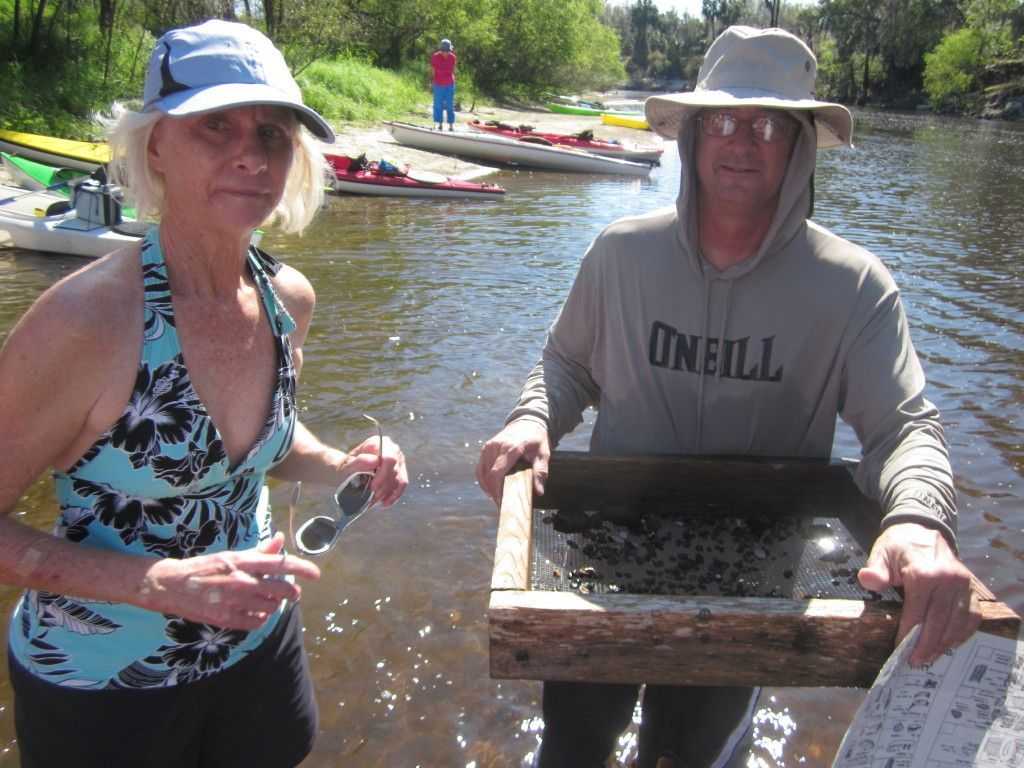
By John Wakeman
Why not combine a paddle down a lazy river with a scientific scavenger hunt for fossil shark teeth and other potential ancient treasures? If this sounds appealing, then a day of kayaking on the Peace River in Arcadia, Florida is just the ticket for you!
Arcadia is a small inland city located an hour west of Okeechobee on State Road 70. If you are approaching Arcadia from Florida’s east coast, SR 70 transects perfectly flat farmland with grazing cattle for as far as the eye can see until you reach the intersection of SR 27 where there is a sudden 100 foot rise in elevation to a ridge. A rapid rise in elevation in South Florida is not at all common and this geologic formation is key to the question you have most likely asked yourself after reading the lead sentence: “Why are there fossil shark teeth in the Peace River when it is located 40 miles inland from the Gulf of Mexico?” The short geologic answer is that over billions of years, the earth has alternated between glaciers and no glaciers in a natural global cooling and global warming cycle. During times of glaciers, the earth’s limited water resources are tied up as ice creating low sea levels and during an inter-glacial period, ice melts creating higher sea levels. The ridge seen at the intersection of SR 27 represents the ancient shoreline from a past inter-glacial period; a time in Florida’s history when a warm shallow sea covered the lower portion of the state. Today the earth is at the end of a glacial period and sea level is still relatively low although rising. The former seafloor mentioned above is now transected by the Peace River, exposing fossil shark teeth, fish vertebrate, dugong (manatee) bones and a surprising assortment of bones from land animals such as mastodon, bison, a giant armadillo, and camels that thrived in the warm climate.
Besides your kayak, you will need a few simple tools to help you search for fossils, a shovel or trowel, a sieve made from ¼ inch hardware screen, a white plastic pan and some Ziploc bags. A fossil collecting permit is required by the state and is available from the University of Florida for $5.00: http://www.flmnh.ufl.edu/vertpaleo/permitapplication. htm.

The best time of year to collect is in the winter when water levels in the Peace River are low; with a recommendation of 12” below normal water level. We visited the Peace River in mid-February and the water level was 29” below normal. If you are not renting from one of the local outfitters, a shuttle will be required. Leave one vehicle at American Legion Park in Arcadia where SR 70 crosses the river and drive twelve miles north on SR 17 to launch your kayak at Brownville Park. The river will wind its way past sandy shorelines but be on the lookout for a gravel bottom, this is where the fossils will be found! Wash a sample of gravel in the sieve and then dump it into a white plastic pan, which will provide contrast to the black gravel as you pick through looking for fossils. On our recent adventure we found mostly fossil shark teeth but did find several pieces of dugong rib and a femur from a land animal.
It is easy to make a weekend of this by reserving a campsite at the Brownville Campground and treating yourself to a meal at Goody’s Café in downtown Arcadia which is like traveling back in time sixty years!
- Canoe Outpost: http://www.canoeoutpost.com/PEACE/
- Canoe Safari: http://www.canoesafari.com/
John Wakeman make be reached by sending an email to treasurecoast@coastalanglermagazine.com.